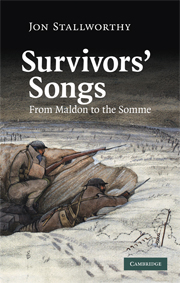Book contents
- Frontmatter
- Contents
- Voice over
- Acknowledgements
- 1 The death of the hero
- 2 Survivors' songs
- 3 England's epic?
- 4 Who was Rupert Brooke?
- 5 Christ and the soldier
- 6 Owen's afterlife
- 7 Owen and his editors
- 8 The legacy of the Somme
- 9 The iconography of the Waste Land
- 10 War and peace
- 11 The fire from heaven
- 12 Henry Reed and the Great Good Place
- 13 The fury and the mire
- Notes
- Index
7 - Owen and his editors
Published online by Cambridge University Press: 06 July 2010
- Frontmatter
- Contents
- Voice over
- Acknowledgements
- 1 The death of the hero
- 2 Survivors' songs
- 3 England's epic?
- 4 Who was Rupert Brooke?
- 5 Christ and the soldier
- 6 Owen's afterlife
- 7 Owen and his editors
- 8 The legacy of the Somme
- 9 The iconography of the Waste Land
- 10 War and peace
- 11 The fire from heaven
- 12 Henry Reed and the Great Good Place
- 13 The fury and the mire
- Notes
- Index
Summary
There is yet another sense in which Wilfred Owen, proclaiming himself ‘a poet's poet’, wrote more prophetically than he knew. The four substantive editions of his poems have been edited by five poets: Sassoon and Edith Sitwell (1920), Blunden (1931), Day Lewis (1963), and Stallworthy (1983).
He died having seen only five of his poems in print: ‘Song of Songs’ in The Hydra/Journal of the Craiglockhart War Hospital and The Bookman; ‘The Next War’ in The Hydra; and ‘Miners’, ‘Futility’, and ‘Hospital Barge’ in the Nation. In June 1918, two and a half months before Owen's return to France for the last time, Edith and Osbert Sitwell encouraged him to submit poems for the 1918 edition of their anthology, Wheels. He sent them eight, but it seems likely that they arrived too late for inclusion. After his death his mother sent a further selection, and Wheels (1919), edited by Edith Sitwell, was dedicated ‘TO THE MEMORY/OF/WILFRED OWEN, M.C.’. It contained seven of his poems: ‘The Show’, ‘Strange Meeting’, ‘À Terre’, ‘The Sentry’, ‘Disabled’, ‘The Dead-Beat’, and ‘The Chances’.
It was almost certainly Edith's enthusiasm for these that prompted the first edition of Owen's Poems published by Chatto & Windus in 1920. Sassoon has been credited with its editing because, as Owen's friend and better-known fellow soldier, he agreed to write the Introduction. This was rushed and unrevealing as, he wrote to Dennis Welland, ‘the whole business was utterly painful to me’.
- Type
- Chapter
- Information
- Survivors' SongsFrom Maldon to the Somme, pp. 81 - 97Publisher: Cambridge University PressPrint publication year: 2008



